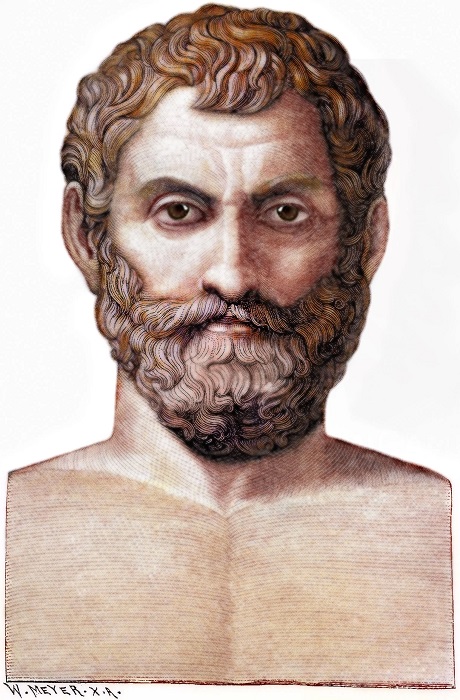Unlocking the Secrets of Nature: The Scientific Revolution of Thales of Miletus
By: Peter Ritdung Wakkias
Introduction
The annals of ancient Greece boast a pantheon of intellectual luminaries, and among them stands Thales of Miletus, a pre-Socratic philosopher whose revolutionary ideas laid the foundation for Western philosophy and science. Born around 626/623 BC in Miletus, a bustling city in Ionia, Asia Minor (modern-day Balat, Didim, Aydın, Turkey), Thales emerged as a beacon of rational inquiry, challenging the prevailing reliance on mythology to explain the world. This article delves into the life, ideas, and contributions of Thales, often regarded as the first philosopher in the Greek tradition, as he unlocked the secrets of nature and spearheaded a scientific revolution.
Early Life and Philosophical Pioneering
Thales, a prominent figure among the Seven Sages, the founding figures of Ancient Greece, left an indelible mark on the intellectual landscape of his time. Renowned for the maxim “know thyself,” inscribed on the Temple of Apollo at Delphi, Thales pioneered a departure from mythological explanations, venturing into the realms of natural philosophy. His groundbreaking ideas encompassed metaphysics, mathematics, and astronomy, making him a trailblazer in deductive reasoning and scientific inquiry.
Thales’s philosophical journey began with the assertion that a single, ultimate substance, the “arche,” underpinned all of nature. In a departure from tradition, he proposed that this fundamental substance was water, positing a worldview where the Earth floated upon water. This marked a pivotal shift from anthropomorphic gods explaining natural phenomena to rational hypotheses grounded in the intrinsic properties of matter.
Contributions to Mathematics and Science
Thales’s intellectual legacy extended beyond philosophy to mathematics and science. His eponymous theorem, foundational in geometry, demonstrated the relationship between angles and intersecting lines, while the intercept theorem, another mathematical milestone, bore his name. Thales’s mathematical prowess extended to practical applications, including calculating the heights of pyramids and distances of ships from the shore.
As an astronomer, Thales’s achievements were equally remarkable. He reportedly predicted weather patterns, solar eclipses, and made notable contributions to celestial observations. Credited with discovering the position of Ursa Major and calculating the timings of solstices and equinoxes, Thales’s celestial insights underscored his multidisciplinary approach to understanding the natural world.
Life and Travels
While details of Thales’s life are primarily derived from Diogenes Laërtius’s “Lives and Opinions of the Eminent Philosophers,” written eight centuries after Thales’s death, his impact is undeniable. Hailing from Miletus, a mercantile city, Thales’s travels, including a purported visit to Egypt, are subjects of scholarly debate. Whether educated in Egypt or Babylon, Thales’s exposure to diverse cultures likely influenced his eclectic approach to philosophy and science.
Thales’s Worldview and Philosophical Significance
Thales’s most enduring philosophical proposition was his assertion that “all is water,” positing water as the arche or originating principle of nature. This idea, transmitted through Aristotle’s “Metaphysics,” reflected Thales’s deep contemplation on the essential substance of the cosmos. While the empirical claim that everything is water is noteworthy, Thales’s profound philosophical insight lay in the unity of substance, suggesting an underlying oneness in the diversity of the natural world.
Mathematics and Practical Applications
Thales’s mathematical acumen, exemplified by his theorems, left an indelible mark on the development of geometry. While later attributions of formal proofs to Thales are speculative, his contributions to geometry, including theorems related to inscribed circles and intersecting lines, underscored his foundational role in mathematical inquiry. Practical applications, such as measuring the height of pyramids and distances of ships, showcased the utility of Thales’s mathematical insights.
Astronomy and Meteorology
Thales’s astronomical endeavors extended to celestial observations, including the position of Ursa Minor and calculations of solstices and equinoxes. Notably, he explained earthquakes as disturbances caused by the Earth floating on water, showcasing a departure from supernatural explanations to naturalistic reasoning. Thales’s meteorological insights, explaining phenomena like the flooding of the Nile, reflected a keen observational mind.
Legacy and Influence
Thales’s death at the age of 78 marked the end of an era, but his intellectual legacy endured. Recognized as one of the Seven Sages and a pioneer in diverse fields, Thales influenced successive generations of philosophers, mathematicians, and scientists. His impact resonated in the Milesian school, where Anaximander and Anaximenes continued the tradition of cosmological inquiry.
Thales’s influence transcended his contemporaneous milieu, reaching luminaries like Pythagoras, who journeyed to Egypt inspired by Thales’s counsel. The Milesian’s legacy resonated in the foundations of Western philosophy, mathematics, and science, marking the birth of a new intellectual epoch.
Conclusion
Thales of Miletus, with his audacious departure from mythological explanations and his embrace of natural philosophy, stands as a vanguard of intellectual progress. From his foundational role in geometry to his profound philosophical insights into the unity of substance, Thales unlocked the secrets of nature, setting the stage for the scientific revolutions that would follow. His influence reverberated through the corridors of time, leaving an indelible mark on the annals of Western thought and laying the groundwork for the scientific exploration that would define subsequent millennia.
